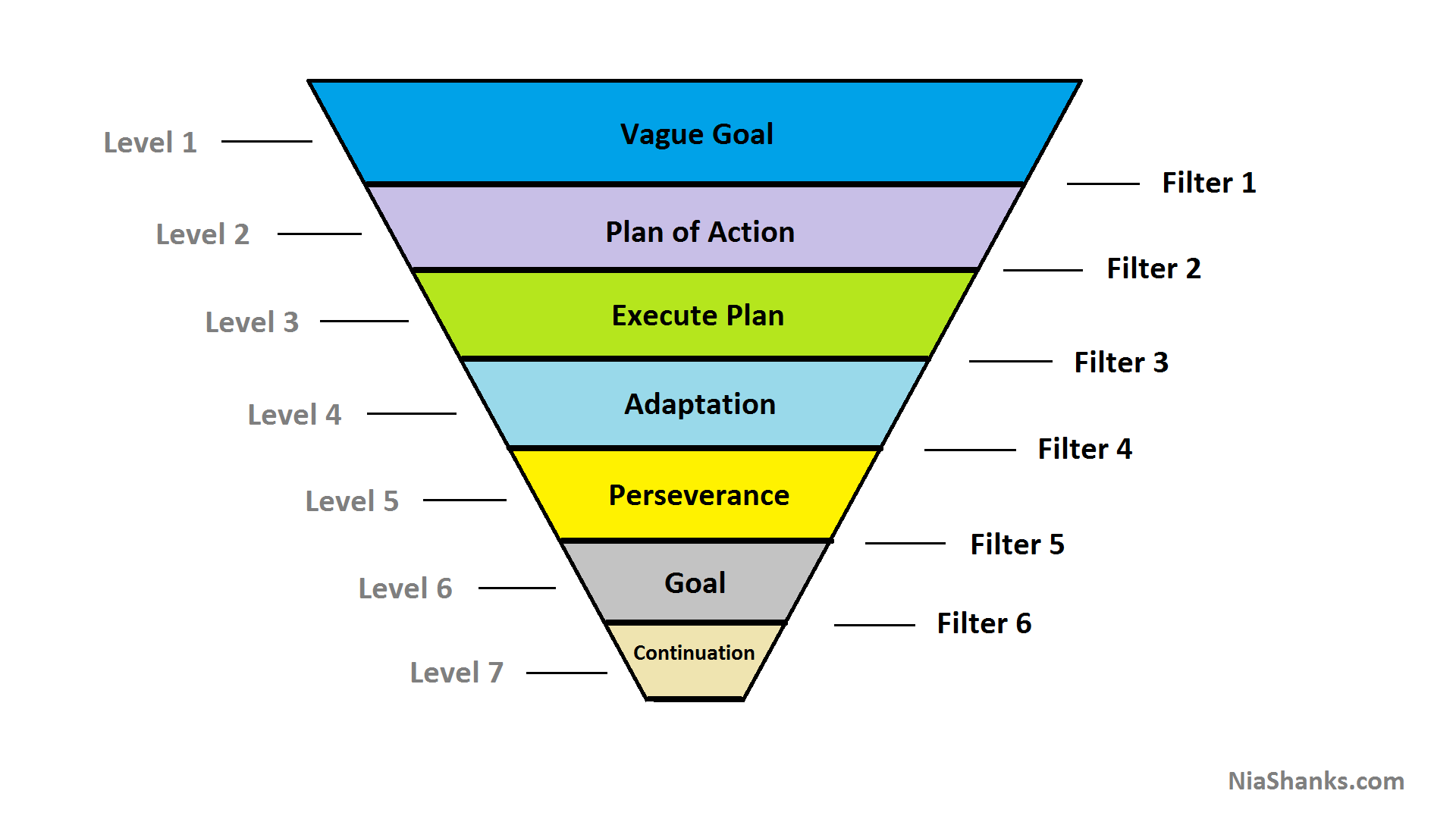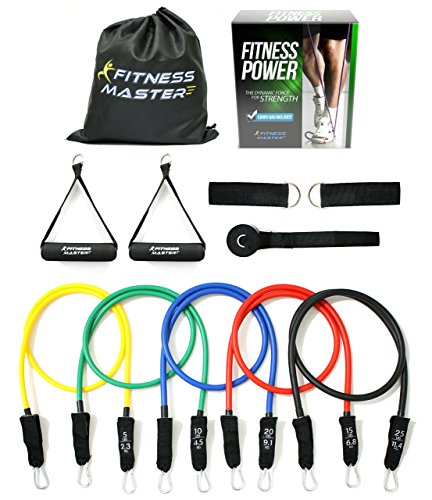I know how she feels, the woman in the picture above. You probably do too.
Many of us set goals, life-changing goals, only to end up not in celebration from reaching them, but in an epic face-plant from failing. We want to achieve goals that could vastly improve our lives, but we usually don’t.
The process of achieving a goal has several steps – levels on a progressively narrowing funnel – you must traverse. If we dumped 100 people into the mouth of the funnel pictured below, fewer people would pass through each successive filter separating the levels. Whereas 100 people entered, only 10 or so would emerge at the final level. The majority, unfortunately, was chewed up and spit out along the way.
The Filter Effect, as I’m calling it, is a result of observations from my own efforts to reach my goals and working with clients for over a decade. If you know too well what it’s like to set lofty goals (e.g., get fit, learn a new language, etc.), but rarely achieve them, this can help you finally break that pattern.

How far down the funnel do you typically make it?
It’s time to turn fantasy goals into reality. Let’s begin at Level 1 and work our way through the funnel, identifying common problems at each Level, along with their solutions, so you can break through each filter.
Level 1: Vague Goal
These are generic goals like getting fit, writing a book, learning a new language, building a savings account, becoming the world’s most distinguished moose whisperer. We’re typically excited at this point because we’re visualizing our future selves once we’ve attained this goal, at Level 6 in our funnel (“I’m gonna be so hot my pants are gonna burst into flames”). We’re ecstatic at the notion of who we’ll be, how we’ll look, and how our lives will be improved once we reach our destination.
Sadly, for many this is the furthest level they reach on the funnel. After all, wanting to do, be, or achieve something is the easy part. Getting through to the next level requires effort.
Level 2: Plan of Action
This is when you determine the actions necessary to achieve your goal. If “get fit” is your goal then your plan of action would include working out frequently, cleaning the junk food out of the house, joining a local gym or even building a home gym.
At Level 2 you say: “My goal is X, and these are the necessary actions to get me there.”
Common problems at Level 2: Having too many items on the to-do list prevents many from going beyond this level, or having an unrealistic plan from the beginning. If your plan of action has A, B, C, D, E, F, G, and H on your to-do list to get to your goal, you’ll likely be overwhelmed from all the required steps and never move into executing your plan. Basically, you have so many things to do that you become overwhelmed, aren’t sure where to begin, and default to doing nothing.
Solution for Level 2 problems: Determine only a few things you must do to reach your goal; don’t include everything you could do in your plan of action. With our get fit example: strength train three days per week with total body workouts and start eating primarily real food (hell, even just tracking everything that passes your lips – nibbles and sips count – for two weeks has shown to help people instinctively make better choices).
Sure, you could make this more complex by adding eat veggies at every meal, eat plenty of protein, drink more water, eat soon after working out, take fish oil capsules, drink green tea, get at least eight hours of sleep every night, perform 30 minutes of cardio on days you don’t strength train, and many additional steps. You can always tweak your plan of action as you progress, but don’t have too many things to do from the beginning.
You’ll have a much easier time progressing to Level 3 if your plan of action is simple, clear, and doable. This Plan of Action should lead to the development of lasting habits. In the words of John Dryden, “We first make our habits, then our habits make us.”
Level 3: Execute Plan
Let’s say you’re sliding down the funnel like your ass is slathered in butter. You breeze through Filter 1 (I’m gonna get sexy), you obliterate Filter 2 (I’m going to strength train three days per week and stock up on minimally processed foods), and you arrive with force at Level 3 – time to execute your brilliant plan: go to the grocery and buy good food and get your butt to the gym.
And you come to a grinding halt. (I think you just got whip-lash.)
Don’t feel bad; this Level is difficult for most. Getting started is often the most challenging step. Your brain is aware of the future reward (getting sexified, or whatever goal you set) if you buy good food and perform a workout, but it craves the immediate reward of planting your rear-end on the couch and not doing a damn thing, except maybe snacking. Pass the chips and remote, please.
Common problems on Level 3: Taking that first crucial, uncomfortable step. This is where many get derailed because even though your brain wants to achieve your goal, it’s stubborn and struggles to see beyond the present moment; it wants instant gratification. Therefore many say, “I’ll start my diet tomorrow,” and skip their workout and make poor food choices today.
Solution for Level 3 problems: Commit to, using the example above, delaying the immediate reward of sitting on the couch and vegging out, or whatever instant gratification your brain desires. If you created a simple plan of action on Level 2, you should be able to execute it because your course of action is clear. Take that first step and get in the gym (heck, just get in the car and start driving) and know you can come home and binge watch your favorite show after you complete your workout.
Know that your brain craves instant gratification. You must delay it – do what you have to do (that workout) and then give yourself the reward you crave (watching an episode of your favorite show). Get good at this level and you’ll make tremendous progress.
Level 4: Adaptation
Let’s be blunt: it doesn’t matter how great your Level 2 Plan of Action is, and the world doesn’t care either. Regardless of how proficient you become at delaying instant gratification in Level 3, something will look at your beautiful plan and toss up two middle fingers your direction while throwing obstacles in your path. Whether you get injured, sick, or your schedule becomes increasingly chaotic, you will face challenges.
This may happen the first day, week, or not until months down the road, but you will encounter challenges that threaten to derail you. Maybe you’ve been going to the gym and haven’t missed a workout, and maybe even started making better food choices. But then, you tweaked your ankle when you walked your dog because he saw a squirrel and took off at full speed making you stumble and twist your ankle which shot a searing pain through your leg and you shrieked “DAMNIT!” as your elderly neighbor was getting her mail and gave you the stink eye for cursing in her presence.
With a busted ankle there’s no way you can perform your workouts. You can’t walk, let alone squat or do lunges; even getting into a push-up position is excruciating. That’s it. Call it quits. Your ride through the funnel has ended. Please exit now and take your belongings with you.
You may not deal with something so drastic, but you will encounter a challenge, or 57, as you work toward your goal.
Common problem on Level 4: Well, Level 4 is the problem. This level will test your discipline and resolve. Sadly, for many, this is where their journey through the funnel ends abruptly. Their plan gets shredded and they abandon their goal; the idea of starting over is overwhelming and deflating, so they don’t.
Solution for Level 4: Use psychologist Gary Klein’s technique discussed in Ryan Holiday’s must-read book The Obstacle is the Way (affiliate link) – perform a premortem. This means preparing for inevitable challenges before there’s even a hint of their arrival, and having a plan to conquer them.
Admit it: things typically don’t go the way you expect. It’s naïve to think you’ll gut it out when a challenge arises or, worse, that nothing will happen because “you’ve got this.” Embrace that attitude and you’ll meet impending failure.
Something will happen and disrupt your routine or momentum. The only solution is to anticipate possible challenges beforehand – the premortem. You may get knocked back and lose your breathe even though you prepared for a challenge, but it’s better than getting knocked down and knocked out cold from being blindsided.
You must be able to adapt to fluid situations.
Sticking with our busted-ankle example, how could you conquer this challenge? You could modify your workouts, this way you’re still taking action. This may mean sticking to upper body exercises or using machines, if that’s all you can do. Is it ideal? Nope. But the important thing is that you do something until this challenge is behind you. You must adapt.
There’s a stunning example in The Obstacle is the Way about Thomas Edison. One evening after dinner, the 67-year-old Edison received news that his research and production campus was on fire. With numerous fire engines and hundreds of spectators gathering to watch the blaze, Edison calmly made his way to the towering inferno with flames up to seven stories high, fueled by the chemicals in the buildings.
Do you know what Edison did as he witnessed years of prototypes, research, and records – his life’s work – incinerate before his eyes? He found his son and told him to get his mother and her friends because “They’ll never see a fire like this again.” His son was dumbfounded at this statement, but Edison assured him, “It’s all right. We’ve just got rid of a lot of rubbish.”
WTF, right? We get irate when someone cuts us off in traffic, but Edison is chill as can be when his life’s work is burning to a crisp.
To make matters worse, Edison and his investors were only insured for about a third of the damage. This was a huge, catastrophic loss in property, work, and years of time and devotion.
And yet, Edison’s response was to start back to work immediately, declaring he wasn’t too old for a fresh start.
Edison looked at this challenge – this disaster – as an opportunity. He definitely didn’t want this to happen, but he had the mental fortitude to acknowledge there’s nothing he could do to change it, so he might as well turn it into an invigorating opportunity.
When a challenge arises, don’t look at it with fear and retreat in defeat. Don’t cry “Poor me, why me.” Accept it, and conquer it. It’s the only option you have if you want to reach your goals.

Maybe you’re currently watching your own unquenchable inferno. Maybe you’re witnessing years of work, tears, and sacrifice turn to smoldering embers and ash by torrent flames.
What is your burning building? What are your efforts/creations/works that are melting in the blaze?
Most importantly: how can you stare at in awe, and declare to turn this disaster into something beautiful, even before the smoke clears? Bad things happen. We can’t prevent them, but we can choose how we respond to them. We can choose to not let them hinder us, but provide an alternate path to our goal.
And if you don’t even smell a whiff of smoke right now, that’s terrific. But know, at some point, you will. Prepare now.
Level 5: Perseverance
Congratulations. If you made it through the previous filter it means you anticipated a challenge, and then kicked it square in the giblets. Adaptation is a new, powerful weapon in your arsenal.
But what about when another, perhaps more daunting, challenge arrives? What if you don’t feel like you’re reaping the rewards you deserve, or expected, from your actions? What about when you squeezed out every last drop of motivation and the temptation to quit seems overwhelming, beckoning you to give in?
Common problems on Level 5: Losing sight of your why (the reason you’re striving for the goal); your whys, or the goal itself, may require an adjustment out of desire or necessity.
Solution for Level 5 problems: There are a few solutions depending on the issue. You could be asking yourself at this level why you’re putting yourself through this. It would be much easier to quit and revert to the path of least resistance. Here are some useful suggestions at this level:
A) Focus on small, frequent wins. In Level 1 you set a beautiful goal, like getting all sexy or losing 30 pounds; maybe becoming fluent in a second language or maxing out your 401K this year. These are BIG goals and you’re anxious with joy at how much more awesome you’ll be once you reach such a lofty milestone.
It’s like when you were a kid and visited family around the holidays. Aunt Mildred made her infamous meat loaf that had the texture of a sponge dipped in crunchy peanut butter and you remember with horror what your Mom said in the car: “You better eat Auntie Mil’s meat loaf with a smile on your face – she declared it a culinary masterpiece even though everyone would rather chew on the soles of their shoes. We only see her once a year, so get it down your throat!” There’s only one way to get that abomination in your belly: one bite at time while softly praying you don’t get oh-my-god-my-butt-is-going-to-burst-pull-the-car-over-NOW-damnit poopsies on the way home.
Potential searing, spontaneous bowel movements aside, let’s go back to the goal you set in Level 1. At this stage of the funnel you’re faced with reality – this goal is hard to achieve. You’ve got to put in a lot of hard work, and you have to do it over and over and over again. Once you master a few basics that finally feel easy, you have to kick your game up a few notches and learn something new.
When you reach Level 5, you have to persevere, and this may mean focusing on small wins instead of the illusive BIG goal to keep you going. Your goal may be to become sexified, but perhaps you need to focus on performing a great workout today, and making a good choice for dinner (small wins, but they add up). Instead of picturing yourself eloquently speaking a second language with ease, focus on becoming proficient with a few basics this month.
By consistently collecting these small wins you may find it easier to persevere, and these small wins add up to HUGE results over time. Shorten your focus to what you can achieve today, this week; they will lead you to the big goal.
B) Change your why(s). Maybe you need to revisit the reason you chose this big goal in the first place. For example, many set the “I’m gonna get sexy” goal because they think losing fat and toning up will bring joy and happiness. But, somewhere along the way, they realize this isn’t the case. They realize building a better looking body won’t improve their self-worth.
In this case, perhaps she changes her why from “this will make me happy” to “this will make me strong and will build a body that serves me, and allows me to do all the things I enjoy.”
C) Modify the goal. Maybe it’s not the why that’s the problem – maybe the goal needs an adjustment. For instance, instead of the initial goal of wanting to lose 30 pounds perhaps our fellow beautiful badass realizes she doesn’t want to focus on a number, or fixing her flaws. Maybe instead she wants to focus on something more motivating like squatting her bodyweight, being able to run hill sprints, or some other performance-oriented goal.
Either of those options can help you persevere when things get tough.
Perseverance has many enemies, but none strong enough to impede or plunder her. She always finds a way to proceed; she may have to take a different route, but she merges onward, ever closer to the goal. And the more she is tested, the more formidable she becomes.
Level 6: The Goal
The fit body; the bigger savings account; the college degree. This is when you indulge in the delicious victory you’ve worked so long to achieve as you reminisce about the bloody battles you fought to bring this to fruition. You may be scraped, bruised, and sore from a few slug-fests, but you finally made it.
There’s no real problem at this stage, only a choice to be made: what does this mean, and where do you go from here?
People react differently to this level. Some are ecstatic and their life is forever changed. Some feel deflated – they thought they’d feel “more” at this point, or that the goal would amplify their happiness, but nothing is really different, or improved.
Those who experience the former will, hopefully, go on to discover what else they can do. They’ll take these new filter-busting skills and tackle other goals. But first, they savor their accomplishment. They realize they can achieve their goals with time and effort. They know nothing worth having is attained with ease, and they don’t have to settle for whatever cards life dealt in the first round.
Those in the latter group may think the next goal will finally make them happy. They, in the case of fitness, can always get leaner or stronger or something-er. This group is constantly chasing the next goal hoping they will finally be happy once they get there. There’s a vapid void they cram with new goals, but it never fills no matter how many milestones they attain.
One difference between the two groups is that the first group – the one that enjoys the victory – manages to find enjoyment in the process required to achieve the goal, but the group that remains unsatisfied expects the reward to be truly life altering. The first group, in the case of fitness, manages to make each workout its own reward; a reward for being alive and capable. The second group trudges through workouts as merely a means to an end. The first group looks for ways to make eating well enjoyable, and not a miserable, depriving lifestyle. The second group equates struggle and misery with a badge of honor.
The point is: learn from the goal. Learn from the journey you took to get there. Embrace the tools you developed, or sharpened, and continue to use them. Don’t let the goal be an end, but rather a beginning to doing more, achieving more, and being more.
Vires acquirit eundo (we gather strength as we go).
Level 7: Continuation
You’d be a fool to spend months learning a new language only to stop speaking it. It would make no sense to dedicate months to eating well and strength training to build a strong, fit body only to give it up completely and return to your pre-strength training lifestyle.
At this level you either maintain your goal and move on to something new (i.e., enter the funnel again at Level 1), or dedicate yourself to reaching a level of mastery in your new skill. It doesn’t really matter what you do at this level, as long as you continue doing something. Don’t waste your efforts or mental strength you’ve forged; put it to use, continually.
How to (Finally) Achieve Your Goal
Want to finally make it through the funnel and achieve your goal? First, set yourself up for success: identify which level you typically encounter trouble. Run one of your previous goals through the funnel – how far did you make it? What filter ended your descent?
I’ll use a client as an example. She discovered her nemesis was Level 4: when things went wrong or a challenge arrived, she gave up. Adaptation was her glaring weakness. In some cases it was something so small as hunger that would derail her; she’d be ravenous after work and instead of going to the gym she’d go home for an early dinner. She always promised herself she’d work out later in the evening, but that never happened. If she didn’t go to the gym after work, she didn’t go at all.
The solution was simple: she’d bring a snack to work that she could eat an hour or so before her work-day was completed, like a protein shake and apple. Instantly the “I’m hungry so I’m going home” excuse was prevented, and off to the gym she went with her hunger satiated. Sometimes it is that simple to make sure you make it to Level 5.
Other times, it’s a larger issue. Maybe your work schedule changes frequently: work with what you have. This may mean working out two days in a row and then doing a third workout a couple days later. Don’t get fixated on what’s ideal – focus on what’s practical for your schedule.
Maybe your battle is mental rather than a schedule conflict. Do what fellow Beautiful Badass Sarah (alias for privacy) did:
“On two occasions I almost avoided the gym (which would have inevitably led to poor food choices later) because I was feeling so low that I was worried about crying in the gym. However, once the warm up was done, I knew that I would smash it out and all would be well. So I did it! Yay! … Also, on practical terms, predict slip ups that might happen early on and try to adjust the plan to avoid them. For example, I told my boyfriend how I was feeling early on, explained that the gym would make me feel better and then got him to drive me there or to go with me.”
Notice the italicized print: she knew it would be a challenge convincing herself to get to the gym. She anticipated this situation and recruited someone to help her out. This is a beautiful example of setting yourself up for success. Identify possible challenges (the premortem in Level 4), and conquer them.
Assess where you typically get off track using The Filter Effect funnel, and then make your way through each filter using the suggestions provided for common problems at each level.
Now you know how to finally achieve your goals and how to defeat common challenges. You should get started, right now.
Like what you read? Never miss a thing. Sign up below to join the Newsletter; you’ll receive the Beautiful Badass Mini Course as a free gift.
The post Achieving Goals is Hard and Most People Fail. Here’s How to (Finally) Succeed. appeared first on Nia Shanks.






